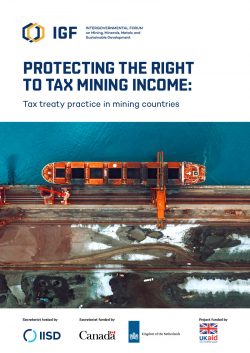 International tax treaties that protect foreign investors from “double taxation” can also prevent governments from collecting expected tax revenue. The Intergovernmental Forum on Mining, Minerals, Metals and Sustainable Development’s (IGF) new practice note aims to help developing countries that have signed treaties or may be considering doing so.
International tax treaties that protect foreign investors from “double taxation” can also prevent governments from collecting expected tax revenue. The Intergovernmental Forum on Mining, Minerals, Metals and Sustainable Development’s (IGF) new practice note aims to help developing countries that have signed treaties or may be considering doing so.
“This is a tool to empower decision-makers and negotiators to improve their tax treaty practice and safeguard their right to tax mining income,” said Alexandra Readhead, the IGF’s Lead, Tax and Extractives. “It shows how governments can better protect their tax base with fairer and more sustainable treaties.”
Tax treaties can pose unique risks for mining countries because the industry commonly involves multinational investors. This gives rise to a range of cross-border transactions and a key question for governments: Which country has the right to tax the income from these transactions, and under what conditions?
“Under tax treaties signed without proper consideration for mining, governments can end up collecting substantially less revenue from the sector than under their domestic law,” Readhead said. “This can put governments in a financial bind and undermine trust in industry.”
The new IGF publication, Protecting the Right to Tax Mining Income: Tax Treaty Practice in Mining Countries, is a practical tool to help governments limit financial risks linked to tax treaties—especially in resource-rich developing countries where the mining sector may be a particularly important source of government revenue.
The practice note outlines the costs and benefits of entering tax treaties as well as how to manage or renegotiate existing agreements. It explains how poorly crafted treaties can lead to tax avoidance and concludes with general recommendations to help governments avoid or reduce revenue risks.
The IGF report draws on several recent examples where tax treaties enabled foreign investors to avoid paying taxes in the resource-hosting country to illustrate material risks to governments.
- Learn more about the IGF’s work on tax base erosion and profit shifting.
- For more information, please contact David Perri, Senior Communications Officer for the IGF at dperri@iisd.ca.

